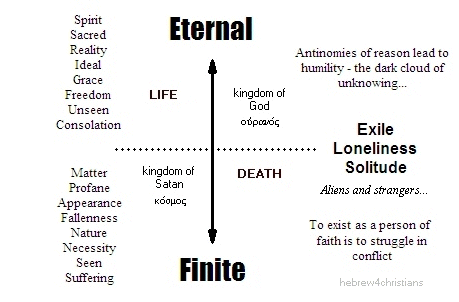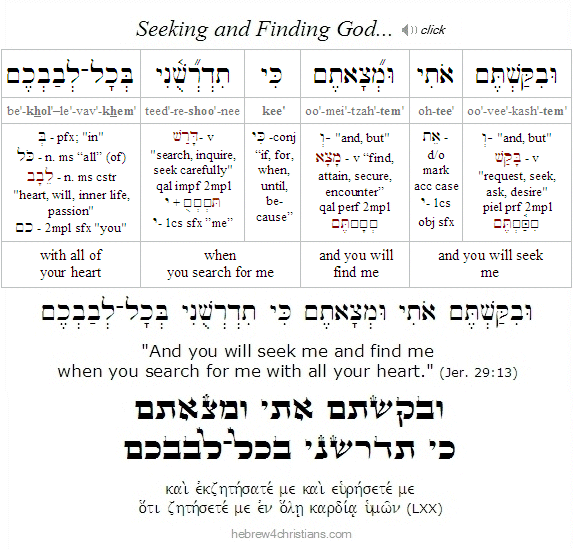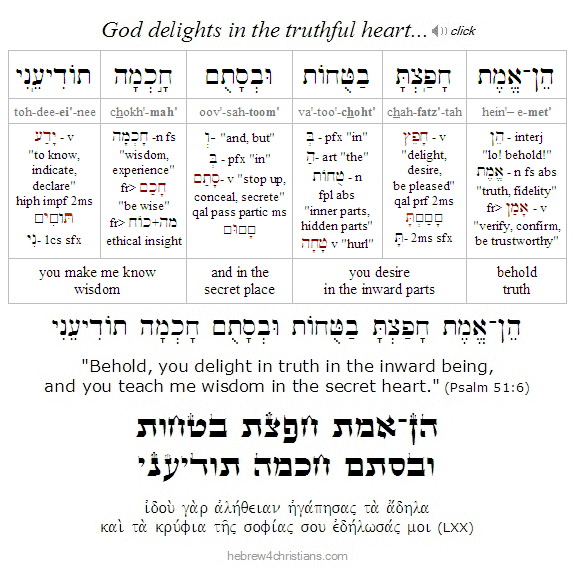|
God created us to ask the "big questions" of life (for example, "Who are we?" "Where did we come from?" "Why are we here?" "Where are we going?" and "What does it all mean?") so that we would seek and to find the meaning for our existence (Jer. 29:13). Honestly pursued, such philosophical questions will disclose an inherent dualism in our reflective consciousness wherein we seek an eternal happiness and ultimate good that transcends anything that may be found in this temporal world (Eccl. 3:11). Faith in the revelation of the Divine Presence therefore confesses that reality itself is "two-tiered," corresponding to two different realms of existence, namely, an "upper realm" of the immaterial and spiritual (i.e., heaven) and a "lower realm" of the material and physical (i.e., the natural universe). Upon reflection we may sometimes feel lonely and bewildered in this duality, not knowing how to "mediate" or bring together the opposite poles of our experience... On the one hand life in this present world is surely fading away, and finitude, dissolution, and the "dust of death" seem omnipresent to our physical senses, nevertheless our hearts yearn for eternity, for unending life, and for the ideal of everlasting significance. We long for meaning, wonder, greatness, and the peace of unconditional love, yet we find ourselves trapped within a diseased and moribund world that is filled with thwarted dreams, painful losses, harrowing vexations, and death... We hunger and thirst for real life, for salvation from our misery, but the cosmological visions of mechanistic science reveal an immense emptiness that has no goal or end, no explanation for its existence, and therefore no meaning or real hope.
 |
Ancient Greek philosophy regarded the soul (i.e., human consciousness) as "imprisoned" within the body, and therefore it advised meditating on intellectual ideals, "forms," and "essences," to transcend the chaos of fate and our natural passions. For them philosophy was really a kind of "recollection" whereby we return to the original Good that has been lost and is presently concealed by the illusion of mere appearances.
Now these ancient Greek philosophers understood the dualistic nature of reality (as far it goes), though of course the Torah had implied these matters long before the advent of Socrates, Plato, and Aristotle... After all, the Torah teaches the experience of dualism and ambiguity is by divine design. Upon earnest reflection the human heart begins to cry out for something more (Eccl. 3:11). Though we understand that we are creatures formed of the dust of the earth, we sense something of the divine within us; we inwardly hear an "echo from Eden" that reminds us of paradise lost... We shrink before our own powerlessness and insignificance yet we dare to believe in the eternal glories of love, beauty, justice, and everlasting life. We simultaneously see ourselves as both physical beings, restricted by time, history, and culture, as well as spiritual beings, transcending the fate of the natural by visions and dreams of the ideal, thereby sensing the glorious and the sacred. Neither of these "polarities" of the soul can be blended or synthesized, however, which leaves us in a state of existential tension wherein we cling to the vision of the Eternal in the midst of the fleeting shadows of this present realm (Rom. 8:4, Gal. 5:16-17).
Biblical faith refuses to "reduce" the significance, value, worth, and aspirations of the human heart into purely natural categories and terms, and therefore spiritual life constitutes a "protest" against any interpretation of reality that excludes, suppresses, denies, or minimizes the Divine Presence. Life in olam hazeh (this world) is corridor leading to the world to come. Our faith affirms that underlying "natural" phenomena is a deeper and higher reality that is ultimately real and abiding. There is an end or "telos" (goal) that sets the direction or Torah of our dualistic existence. Faith "sees what is invisible" (2 Cor. 4:18) and understands (i.e., accepts) that the "present form (ŽäßĮĖ ŽāŽćß┐å╬╝╬▒) of this world is passing away" (1 Cor. 7:31). The heart of faith looks beyond this realm to behold a city whose designer and builder is God Himself (Heb. 11:10). "So we do not lose heart... For the things that are seen are turning to dust, but the things that are unseen endure forever" (2 Cor. 4:16-18).
It has been said that God "hides" so that we may learn to seek Him. This seeking involves all our heart, since we will not seek God until we understand the inner crisis. It is not enough to know right words of theology, since we must learn to think the right way, and this comes at the cost of struggle, wrestling, and testing. We cannot rely on reason alone to guide us, for that relegates beauty, mystery, and hope into oblivion; nor can we dismiss reason, for then faith becomes absurd and ridiculous. We must find a delicate balance: "faith seeking understanding," knowing when it is right to question, to doubt, and to analyze, and when it is right to affirm, to submit, and to surrender. Reason is a servant of something more fundamental, namely the heart or the will; it is activated at the stir of the soul's desire.
ūĢų╝ūæų┤ū¦ų╝ųĘū®ūüų░ū¬ų╝ųČūØ ūÉū¬ų┤ūÖ ūĢų╝ū×ų░ū”ųĖūÉū¬ųČūØ
ūøų╝ų┤ūÖ ū¬ų┤ūōų░ū©ų░ū®ūüų╗ūĀų┤ūÖ ūæų╝ų░ūøųĖū£ųŠū£ų░ūæųĘūæų░ūøųČūØ
oo┬Ęvee┬Ękash┬Ętem ┬Ę oh┬Ętee ┬Ę oo┬Ęme┬Ętza┬Ętem
kee ┬Ę teed┬Ęre┬Ęshoo'┬Ęnee ┬Ę be┬Ękhol - le┬Ęvav┬Ękhem

"You will seek me and find me
if you search for me with all your heart"
(Jer. 29:13)

Hebrew Lesson:
Jeremiah 29:13 Hebrew reading (click):
The dualism of life shows up within our hearts as well, as we wrestle with our own faith and with "double-mindedness," that is, the ambivalence that results from not having our minds made up. On the one hand, we need to confess the truth of our radical sinfulness, our depravity, our brokenness, and so on, while on the other we must learn to know ourselves as the "beloved" and to find faith that God's blessing indeed belongs to us -- that Yeshua gave his life for us -- despite ourselves. We have to be willing to take God's new name for us and believe that God has transformed our deepest nature for eternal good. We have to be renamed from "Jacob" to "Israel," and yet we know ourselves as both... In other words, we must learn to "put on" the new nature and to "put off" the carnal reasoning of our former life. The answer for us is found in the word "miracle," as God in great mercy and compassion regenerates us, comforts us, and then guides our way back to the truth of his salvation.
ūöųĄū¤ųŠūÉų▒ū×ųČū¬ ūŚųĖūżųĘū”ų░ū¬ų╝ųĖ ūæųĘūśų╝ų╗ūŚūĢų╣ū¬
ūĢų╝ūæų░ūĪųĖū¬ų╗ūØ ūŚųĖūøų░ū×ųĖūö ū¬ūĢų╣ūōų┤ūÖūóųĄūĀų┤ūÖ
hein - e┬Ęmet ┬Ę cha┬Ęfatz'┬Ęta ┬Ę va┬Ętoo┬Ęchot
oov┬Ęsa┬Ętoom ┬Ę chokh┬Ęmah ┬Ę to┬Ędee┬Ęei'┬Ęnee

"Behold, you delight in truth in the inward being,
and you will teach me wisdom in the secret heart"
(Psalm 51:6)

Hebrew Lesson:
Psalm 51:6 Hebrew reading (click):
|






